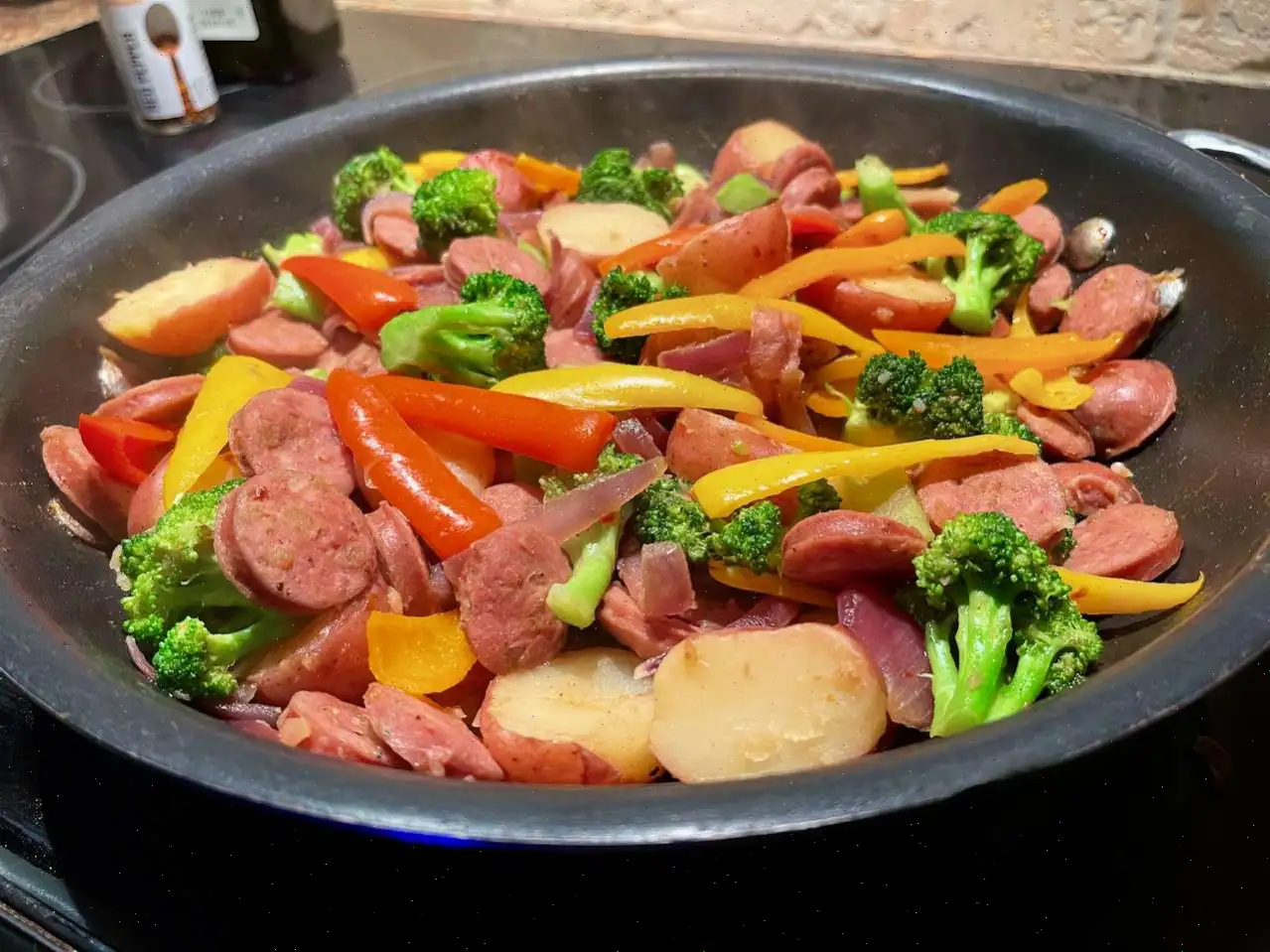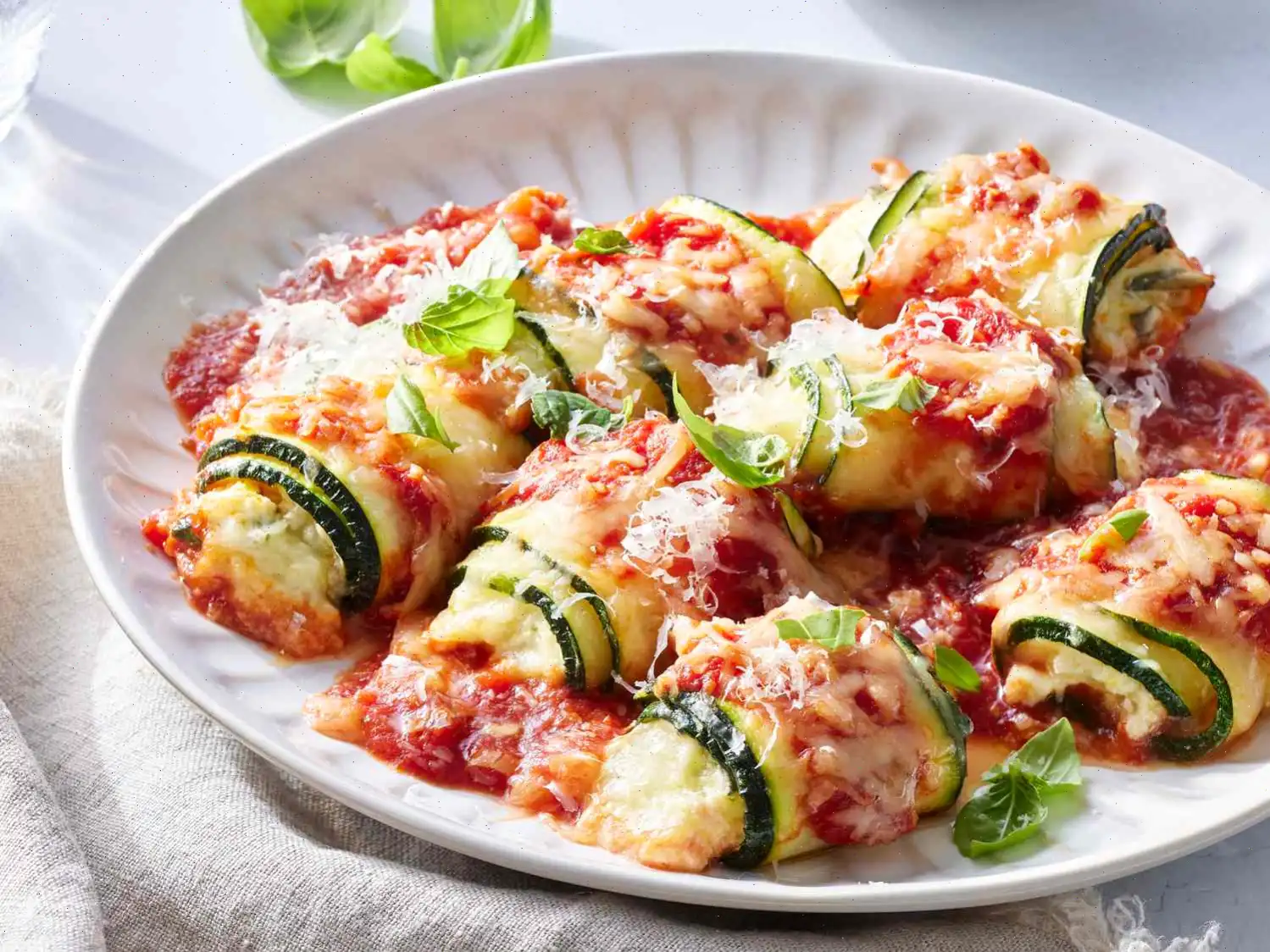
Crea una sinfonía chispeante de salchichas y verduras.
En esta receta de salchichas y verduras en sartén, las salchichas se cocinan junto con una mezcla de verduras coloridas para una comida rápida y deliciosa. Este plato de una sola sartén es perfecto para una cena entre semana ocupada o un brunch sencillo el fin de semana. Con solo unos pocos ingredientes y un tiempo de preparación mínimo, puedes tener una comida sabrosa y nutritiva en poco tiempo. Disfruta de la combinación reconfortante de salchichas y verduras en este plato fácil y satisfactorio.
Ingredientes (Rinde 5 porciones)
- 450 gramos de papas rojas, cortadas por la mitad o en cuartos si superan 5 cm
- 2 cucharadas de aceite de oliva
- 450 gramos de salchicha de pollo con manzana ya cocida, rebanada en piezas de 0,5 cm
- 1/2 cucharadita de hojuelas de chile rojo
- 1 cebolla roja, cortada en tiras verticales
- 1 1/2 tazas de pimientos de colores variados, cortados en tiras
- 1 taza de ramilletes de brcoli
- 2 dientes de ajo, finamente picados
- 1 taza de caldo de pollo
- Sal y pimienta negra recin molida al gusto
Preparacin
- Coloca las papas en una cacerola grande y cbrelas con agua salada. Lleva a ebullicin, reduce el fuego y cocina a fuego lento durante 10 minutos hasta que empiecen a ablandarse. Escurre y reserva.
- Calienta el aceite de oliva en una sartn antiadherente de 30 cm a fuego medio. Aade las papas precocidas y frelas, removiendo de vez en cuando, hasta que adquieran un tono dorado, aproximadamente 15 minutos.
- Agrega las rebanadas de salchicha y espolvorea las hojuelas de chile rojo. Revuelve durante un minuto para que se liberen los aromas.
- Incorpora la cebolla, los pimientos y el brcoli a la sartn. Cocina durante 3 minutos o hasta que el brcoli tenga un color verde intenso y est ligeramente tierno.
- Integra el ajo picado y vierte el caldo de pollo. Sube el fuego para llevar a ebullicin suave y contina la coccin hasta que la mayor parte del lquido se reduzca.
- Rectifica con sal y pimienta al gusto. Sirve caliente para disfrutar de un plato lleno de sabor.
Informacin Nutricional (por porcin)
- Caloras: 358
- Grasas totales: 16 g (20% VD)
- Grasas saturadas: 3 g (15% VD)
- Colesterol: 85 mg (28% VD)
- Sodio: 759 mg (33% VD)
- Carbohidratos: 27 g (10% VD)
- Fibra diettica: 4 g (13% VD)
- Azcares: 4 g
- Protenas: 26 g (53% VD)
- Vitamina C: 92 mg (102% VD)
- Calcio: 57 mg (4% VD)
- Hierro: 3 mg (15% VD)
- Potasio: 1027 mg (22% VD)
Nota: Los valores diarios se basan en una dieta de 2,000 caloras. Las necesidades individuales pueden variar. El contenido nutricional puede diferir segn la marca de los ingredientes. Consulte a un profesional de la salud si sigue una dieta restringida antes de preparar este plato.
El plato conocido hoy como Salchicha con Verduras en Sartn tiene sus races en la cocina casera tradicional estadounidense, especialmente a mediados del siglo XX, cuando las comidas de un solo sartn se hicieron populares por su comodidad y limpieza mnima. Se origin a partir de combinaciones europeas de salchicha y patatas, tradas a Estados Unidos por inmigrantes de Alemania, Polonia e Italia. Con el tiempo, la receta se adapt a los ingredientes locales, incorporando pimientos, brcoli y salchicha de pollo con manzana, lo que le da un giro moderno a un clsico plato reconfortante.
Caractersticas Regionales
Aunque esta receta se disfruta en todo Estados Unidos, presenta variaciones sutiles segn la regin. En el Medio Oeste, las patatas se suelen hervir parcialmente y luego asar junto con la salchicha, creando un plato contundente ideal para climas fros. En el Sur, se prefieren las salchichas ahumadas con un toque de especias, como hojuelas de pimiento rojo, resaltando sabores intensos. En las zonas costeras, se incluyen ms verduras frescas o salchichas de mariscos, mostrando la flexibilidad de este plato para reflejar los gustos locales y la disponibilidad estacional.
Diferencias con Platos Similares
A diferencia de un cazuela de salchicha tradicional o un salteado de salchicha, la Salchicha con Verduras en Sartn se centra en la simplicidad y rapidez, manteniendo el contraste de texturas. Las verduras se cocinan hasta quedar tiernas pero crujientes, y las salchichas se doran ligeramente en lugar de cocinarse completamente en un guiso. Esto permite que los sabores de cada ingrediente permanezcan distintivos, logrando un equilibrio entre la dulzura de los pimientos, la tierra de las patatas y el sabor salado de la salchicha. A diferencia de un plato con pasta, es ms ligero y bajo en carbohidratos.
Ocasiones Tpicas para Servirlo
Este plato se sirve comnmente como cena familiar, acompaado de pan fresco o una ensalada. Es especialmente popular para cenas entre semana por su rpida preparacin y limpieza sencilla. Tambin se sirve en reuniones informales, comidas compartidas o incluso en brunches, especialmente usando salchichas estilo desayuno. Su preparacin en un solo sartn lo hace prctico y visualmente atractivo al llevarlo directamente a la mesa.
Datos Interesantes
- La salchicha de pollo con manzana, frecuentemente usada en esta receta, se origin en Estados Unidos a finales del siglo XX como una alternativa ms suave a la salchicha de cerdo, combinando sabores salados y dulces.
- Usar un solo sartn ayuda a conservar los nutrientes de las verduras comparado con hervirlas por separado, haciendo de este plato una opcin relativamente saludable.
- Las hojuelas de pimiento rojo, aunque opcionales, reflejan la influencia del Sur, aadiendo un toque de calor sin dominar los otros sabores.
- El plato ha inspirado numerosas variantes en todo el mundo, incluyendo versiones vegetarianas con salchichas de origen vegetal o diferentes verduras de raz.
- Su adaptabilidad permite acompaarlo con diversas bebidas, desde refrescos casuales hasta vinos ligeros, lo que lo hace verstil para muchas ocasiones.







